Elisabeth Elliot was a Christian missionary, author, and speaker. Her first husband, Jim Elliot, was killed in 1956 while attempting to make missionary contact with the Auca people of eastern Ecuador. She later spent two years as a missionary to the tribe members who killed her husband. Returning to the United States after many years in South America, she became widely known as the author of over twenty books and as a speaker. Elliot toured the country, sharing her knowledge and experience, well into her seventies.

The Huaorani, Waorani, or Waodani, also known as the Waos, are an Indigenous people from the Amazonian Region of Ecuador who have marked differences from other ethnic groups from Ecuador. The alternate name Auca is a pejorative exonym used by the neighboring Quechua natives, and commonly adopted by Spanish-speakers as well. Auca means 'savage'.
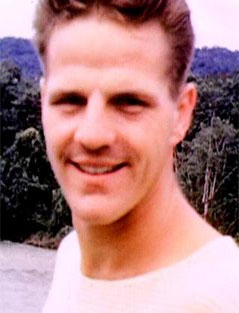
Philip James Elliot was an American Christian missionary and one of five people killed during Operation Auca, an attempt to evangelize the Huaorani people of Ecuador.

Nathanael Saint was an evangelical Christian missionary pilot who, along with four others, was killed in Ecuador while attempting to evangelize the Huaorani people through efforts known as Operation Auca.

End of the Spear is a 2005 American biographical adventure drama film directed by Jim Hanon, written by Bill Ewing, Bart Gavigan and Hanon, and stars Louie Leonardo and Chad Allen. The film recounts the story of Operation Auca, in which five American Christian missionaries attempted to evangelize the Waodani people of the tropical rain forest of Eastern Ecuador.

Operation Auca was an attempt by five Evangelical Christian missionaries from the United States to bring Christianity to the Waodani or Huaorani people of the rain forest of Ecuador. The Huaorani, also known pejoratively as Aucas, were an isolated tribe known for their violence, against both their own people and outsiders who entered their territory. With the intention of being the first Christians to evangelize the previously uncontacted Huaorani, the missionaries began making regular flights over Huaorani settlements in September 1955, dropping gifts, which were reciprocated. After several months of exchanging gifts, on January 3, 1956, the missionaries established a camp at "Palm Beach", a sandbar along the Curaray River, a few kilometers from Huaorani settlements. Their efforts came to an end on January 8, 1956, when all five—Jim Elliot, Nate Saint, Ed McCully, Peter Fleming, and Roger Youderian—were attacked and speared by a group of Huaorani warriors. The news of their deaths was broadcast around the world, and Life magazine covered the event with a photo essay.

Rachel Saint was an American evangelical Christian missionary who worked in Ecuador, with her language helper Dayuma translating the Gospel of Mark and the book of Acts into the Wao tededo language of the Huaorani people.
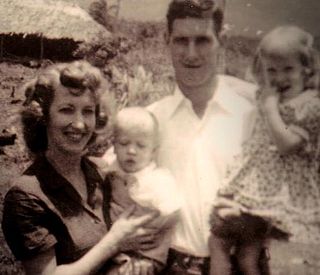
Roger Youderian was an American Christian missionary to Ecuador who, along with four others, was killed while attempting to evangelize the Huaorani people through efforts known as Operation Auca.
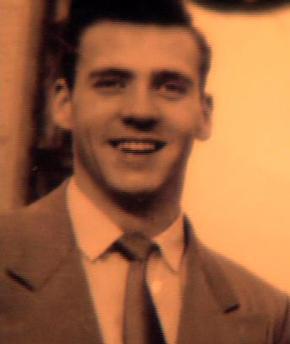
Theophilus McCully was a Christian missionary to Ecuador who, along with four other missionaries, was killed while attempting to evangelize the Huaorani people, through efforts known as Operation Auca.

Arajuno is a jungle community in the Ecuadorian rainforest. It is also a Canton in the Pastaza Province. It is located on the Arajuno River, a tributary of the Curaray. The area is inhabited by Quichua Indians.
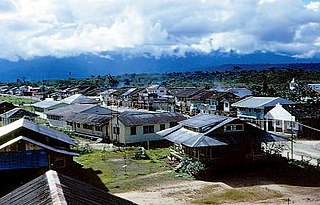
Shell is a city located on the western edge of the Ecuadorian Amazon and in the eastern foothills of the Andes. It is located about 94 miles (151 km) southeast of Quito, and roughly 4 miles (6.4 km) west of the provincial capital, Puyo. Its name comes from the Royal Dutch Shell corporation.

Peter Sillence Fleming was a Christian who was one of five missionaries killed while participating in Operation Auca, an attempt to evangelize the Huaorani people of Ecuador.
Mincaye Enquedi was a Huao Ecuadorian preacher and church elder. In 1956, he took part in the now infamous attack on five missionaries during Operation Auca. He is believed to have speared both Nate Saint and Ed McCully during the attack.
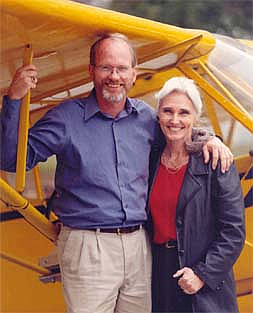
Stephen Farris Saint is an Ecuadorian-born business entrepreneur, pilot, and author. He is known for being the son of Nate Saint, a famous missionary pilot, as well as for his own work among indigenous tribes.
Shandia is a village located in the rainforest of eastern Ecuador. It is inhabited mostly by indigenous peoples of the Kichwa Nationality.

Beyond the Gates of Splendor is a documentary film that was released in 2004. It chronicles the events leading up to and following Operation Auca, an attempt to contact the Huaorani tribe of Ecuador in which five American missionaries were killed. The film was produced by Bearing Fruit Productions and distributed by Every Tribe Entertainment.
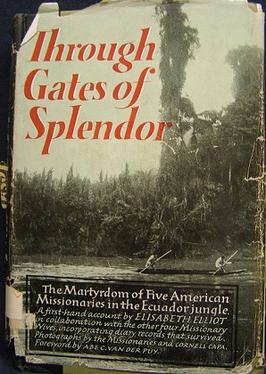
Through Gates of Splendor is a 1957 best selling book written by Elisabeth Elliot. The book tells the story of Operation Auca, an attempt by five American missionaries – Jim Elliot, Pete Flemming, Ed McCully, Nate Saint, and Roger Youderian – to reach the Huaorani tribe of eastern Ecuador. All five of the men were killed by the tribe. The book is Elliot's first book, and arguably her most well-known work.
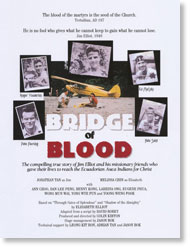
Bridge of Blood: Jim Elliot Takes Christ to the Aucas is a 1973 readers' theatre play based on the story of Operation Auca. It was written by David Robey, a former drama professor at Cedarville University, and produced by Lillenas Drama in 1988.
Avant Ministries is a non-profit, Christian mission agency focused on planting and developing churches worldwide. Headquartered in Kansas City, Missouri, and Winnipeg, Manitoba, Avant missionaries serve in church planting and church support ministries in Africa, Asia, Europe and North and South America.











